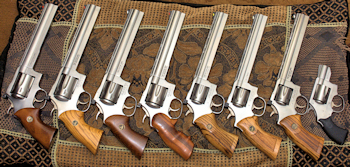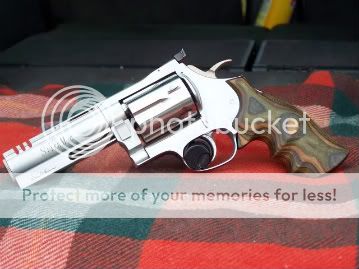June 8, 2009
 Offline
OfflineHas any one experimented with different barrel nut torque? Is there a factory standard? Did it change accuracy? How do you determine what is best? Everyone have "trained" fingers?
I've been thinking about playing with this idea and dropped one of the after market suppliers of wrenches a note and asked about getting one made up with a square drive so I could use a torque wrench to adjust and set the nut with some accuracy.
He hasn't done it, but has thought about it some. Wanted to know what size would be best. I'm thinking 3/8" drive.
Any thoughts?
DISCLAIMER: After the discussions on .22 accuracy, I'm not the one to do accuracy tests on any thing...my 20+ power any thing starts getting into spotting scopes...but thought it might be a fun experiment.
February 2, 2009
 Offline
Offline3/8" would be the largest I'd try as the original DW manual states moderate tightness and I don't know how much torque the barrel nut can take. It's secured in a socket of sorts, but the nut itself is relative thin and with the notches even thinner, and I would it would be subjest to stress fracturing at the notches. Good luck and post your results; if you do it.
Range Officer

Range Officers

Dans Club
February 28, 2009
 Offline
Offline
Dans Club
March 2, 2008
 Offline
OfflineI know that my first 15-2 was sent back to the factory in in 1978 because I over tightened the barrel nut, then rounded out the nut trying to remove it.
The key to DW accuracy is the tensioning of the barrel between two points, frame and barrel nut. The tension is equal at both points because the barrel "free floats" in the shroud, expanding and contracting equally from both ends toward the centerpoint. A standard barrel "whips" at the muzzle end, because it is secured only at the frame end. More force (than firmly secured) should have no effect on accuracy.
The S&W Performance Center revolvers now feature a tensioned barrel, not user adjustable or removeable
I went to a bookstore and asked the saleswoman "Were is the Self Help Section?" She said if she told me, it would defeat the purpose.
George Carlin
June 8, 2009
 Offline
OfflineThere may be a miscommunication going on here. I'm not going to hook up a 1/2″ torque wrench and see if I can twist off the barrel. I'm talking about a constant XX inch-pounds of torque. Up a few and down a few to see if it makes any difference.
Seems like the M14 gas plug is around 14 inches…might be a good place to start.
This all assumes I can get a wrench made up…might be no market for the maker.
Edit: I appreciate the warnings.
December 17, 2008
 Offline
OfflineHere's the procedure:
I believe Sears still sells a 1″ drive socket set and you can get a half dozen adapters to knock that baby down to 1/4″.
Go get a couple of two by fours to cushion the jaws of your bench vise and solidly secure the revolver in the vice – and when I say solidly, I mean stand on the bench and jump up and down on the vise handle.
OK, now we've secured the patient, we're ready to seriously tighten that nasty little barrel nut down. Remember: a loose nut is a democra…er, I mean, a loose nut is an unsafe nut…
Alright, now first, check your Denver Diesel Catapillar Engine Torque manual…I wouldn't think for a second that you want to exceed 300 ft/lbs…those barrel nuts can be touchy…
Ok, now with both hands on the 1″ drive breaker bar…
Actually now that I think about it, uh, yeah…hand tight is fine… 
Range Officer

Range Officers

Dans Club
February 9, 2009
 Offline
Offline
DWF Supporters

Dans Club

Moderators
November 17, 2008
 Offline
OfflineFebruary 2, 2009
 Offline
OfflineOn at least 2 occasions I've brought extra barrels to test reloads in different length barrels and didn't have the wrench. I've since bought 3 spare wrenches and one stays in my range bag and one in the truck. The others are in the DW marked drawer with spare gauges and misc. parts. Please give us details of your experiment, keep detailed records. That extra 1/4" in accuracy may be just a ftlb away.
April 25, 2008
 Offline
Offlinejaggman said:
And is it adviseable to check the nut (not the one pulling the trigger) during a day at the range?
That is a good idea. Those barrel nuts will come loose. When I use mine on the silhouette range, they can go thru 100+ rounds in a day, and I've seen several that loosen up, even thought they are tightened well to start with.
How do I know they are loose? When I have the cylinder gap properly set, and the barrel nut properly tightened, I mark the ends of the barrel with a sharpie right across the slots on the nut and shroud, like this:
Then, a mere glance at the alignment marks (when the gun is empty, obviously) will tell me if the nut has loosened any. After cleaning, just redo the marks.
The Savantist

Range Officer

Range Officers

Dans Club
February 28, 2009
 Offline
Offlinejaggman said:
And is it adviseable to check the nut (not the one pulling the trigger) during a day at the range? I usually forget my wrench until I get there but haven't had any issues yet.
Maybe it's a good idea to periodically check the nut behind the trigger as well. If that one comes loose everyone at the range is in danger.

-Mike

Supporter

Moderators
January 24, 2009
 Offline
OfflineRange Officer

Range Officers

Dans Club
February 9, 2009
 Offline
OfflineFebruary 2, 2009
 Offline
OfflineI could have used the marker idea today; just got my model 40 back last week and today was my first day to try my scoped barrel. It started about 10" high at 25yds so I adjusted it down and fired 3 shot groups til in ball park, moved target to 60 yds and was getting a larger group, was preturbed til I checked the scope's tightness and noticed shroud movement, tightened up barrel nut and groups returned to 1", what a relief.
Apparently there is a small misunderstanding here. This actually may be a very good and valid idea.
It is not about how tight you can get it. It is about consistency and just the right amount of tension.
I would think that a 1/4 inch drive would be not only sufficent, but required as we are only talking about 15 or so inch pounds. anything bigger would not provde enough accuracy at such low torques.

DWF Supporters

Dans Club

Moderators
November 17, 2008
 Offline
OfflineLeonardC. Now that we have all had fun poking fun.  I have an idea which may allow you to test your theory without having to manufacture a wrench. If memory serves me (no guarantee on that) the old style barrel wrench for the early models which used a plug for the recessed barrel nut with the wrench for the exposed nut, the plug fits a standard SAE wrench. Find one of the early wrenches and use it in conjunction with a standard torque wrench. It will be interesting to see if barrel torque changes accuracy. Any way just a thought.
I have an idea which may allow you to test your theory without having to manufacture a wrench. If memory serves me (no guarantee on that) the old style barrel wrench for the early models which used a plug for the recessed barrel nut with the wrench for the exposed nut, the plug fits a standard SAE wrench. Find one of the early wrenches and use it in conjunction with a standard torque wrench. It will be interesting to see if barrel torque changes accuracy. Any way just a thought.
Wisdom is merely the realization of how little one knows, therefore I am wise.
1 Guest(s)

 Register
Register Log In
Log In Home
Home













